12 start with D start with D
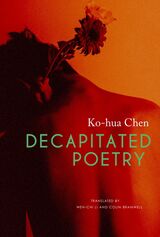
Ko-hua Chen’s Decapitated Poetry was the first explicitly queer book of poems published in Taiwan and remains a foundational work in Taiwanese poetry. Decades after it first appeared in 1995, this collection retains the capacity to shock, appall, and jolt readers into recognizing homosexuality as its own specific category of being. Behind Chen’s depictions of the disjunctive realities of queer erotic life, a formidable and uncompromising poetic intelligence can be seen at play. Alongside the erotic, satirical offerings from Decapitated Poetry, this volume includes selections from Chen’s remarkable sci-fi sequences that offer further transcorporeal meditations on forbidden queer love. Excoriating, heretical, tender, and always alive to the transgressive potential of language, this exhilarating volume from Seagull’s Pride List is the perfect introduction to one of Taiwanese poetry’s most daring voices.

In this study of desire in Late Imperial China, Martin W. Huang argues that the development of traditional Chinese fiction as a narrative genre was closely related to changes in conceptions of the fundamental nature of desire. He further suggests that the rise of vernacular fiction during the late Ming dynasty should be studied in the context of contemporary debates on desire, along with the new and complex views that emerged from those debates.
Desire and Fictional Narrative in Late Imperial China shows that the obsession of authors with individual desire is an essential quality that defines traditional Chinese fiction as a narrative genre. Thus the maturation of the genre can best be appreciated in terms of its increasingly sophisticated exploration of the phenomenon of desire.
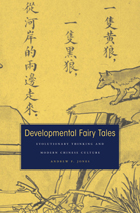
In 1992 Deng Xiaoping famously declared, “Development is the only hard imperative.” What ensued was the transformation of China from a socialist state to a capitalist market economy. The spirit of development has since become the prevailing creed of the People’s Republic, helping to bring about unprecedented modern prosperity, but also creating new forms of poverty, staggering social upheaval, physical dislocation, and environmental destruction.
In Developmental Fairy Tales, Andrew F. Jones asserts that the groundwork for this recent transformation was laid in the late nineteenth century, with the translation of the evolutionary works of Lamarck, Darwin, and Spencer into Chinese letters. He traces the ways that the evolutionary narrative itself evolved into a form of vernacular knowledge which dissolved the boundaries between beast and man and reframed childhood development as a recapitulation of civilizational ascent, through which a beleaguered China might struggle for existence and claim a place in the modern world-system.
This narrative left an indelible imprint on China’s literature and popular media, from children’s primers to print culture, from fairy tales to filmmaking. Jones’s analysis offers an innovative and interdisciplinary angle of vision on China’s cultural evolution. He focuses especially on China’s foremost modern writer and public intellectual, Lu Xun, in whose work the fierce contradictions of his generation’s developmentalist aspirations became the stuff of pedagogical parable. Developmental Fairy Tales revises our understanding of literature’s role in the making of modern China by revising our understanding of developmentalism’s role in modern Chinese literature.
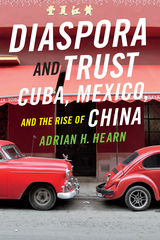


Contributors. Jing Chen, Timothy Clifford, Yi-long Huang, Chao-lin Liu, Thomas Mazanec, Evan Nicoll-Johnson, Qiao Junjun, Donald Sturgeon, Jeffrey Tharsen, Wang Zhaopeng, Bingyu Zheng, Mariana Zorkina
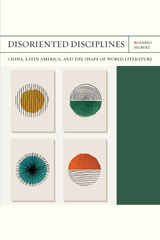
In the absence of specialized programs of study, abstract discussions of China in Latin America took shape in contingent critical infrastructures built at the crossroads of the literary market, cultural diplomacy, and commerce. As Rosario Hubert reveals, modernism flourishes comparatively, in contexts where cultural criticism is a creative and cosmopolitan practice.
Disoriented Disciplines: China, Latin America, and the Shape of World Literature understands translation as a material act of transfer, decentering the authority of the text and connecting seemingly untranslatable cultural traditions. In this book, chinoiserie, “coolie” testimonies, Maoist prints, visual poetry, and Cold War memoirs compose a massive archive of primary sources that cannot be read or deciphered with the conventional tools of literary criticism. As Hubert demonstrates, even canonical Latin American authors, including Jorge Luis Borges, Octavio Paz, and Haroldo de Campos, write about China from the edges of philology, mediating the concrete as well as the sensorial.
Advocating for indiscipline as a core method of comparative literary studies, Disoriented Disciplines challenges us to interrogate the traditional contours of the archives and approaches that define the geopolitics of knowledge.
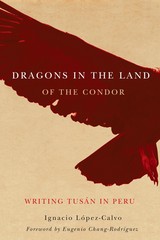
While authors like Siu Kam Wen and Julia Wong often rely on their Chinese cultural heritage for inspiration, many others, like Pedro Zulen, Mario Wong, and Julio Villanueva Chang, choose other sources of inspiration and identification. López-Calvo studies the different strategies used by these writers to claim either their belonging in the Peruvian national project or their difference as a minority ethnic group within Peru. Whether defending the rights of indigenous Peruvians, revealing the intricacies of a life of self-exploitation among Chinese shopkeepers, exploring their identitarian dilemmas, or re-creating—beyond racial memory—life under the political violence in Lima of the 1980s, these authors provide their community with a voice and a collective agency, while concomitantly repositioning contemporary Peruvian culture as transnational.
López-Calvo bridges from his earlier study of Peruvian Nikkei’s testimonials and literature and raises this question: why are Chinese Peruvian authors seemingly more disconnected from their Asian heritage than Japanese Peruvian authors from theirs? The author argues that the Chinese arrival in Peru half a century earlier influenced a stronger identification with the criollo world. Yet he argues that this situation may soon be changing as the new geopolitical and economic influence of the People’s Republic of China in the world, particularly in Latin America and the Caribbean, affects the way Chinese and Sino–Latin American communities and their cultures are produced and perceived.

What drives literary change? Does literature merely follow shifts in a culture, or does it play a distinctive role in shaping emergent trends? Michael Fuller explores these questions while examining the changes in Chinese shi poetry from the late Northern Song dynasty (960–1127) to the end of the Southern Song (1127–1279), a period of profound social and cultural transformation.
Shi poetry written in response to events was the dominant literary genre in Song dynasty China, serving as a central form through which literati explored meaning in their encounters with the world. By the late Northern Song, however, old models for meaning were proving inadequate, and Daoxue (Neo-Confucianism) provided an increasingly attractive new ground for understanding the self and the world. Drifting among Rivers and Lakes traces the intertwining of the practice of poetry, writings on poetics, and the debates about Daoxue that led to the cultural synthesis of the final years of the Southern Song and set the pattern for Chinese society for the next six centuries. Examining the writings of major poets and Confucian thinkers of the period, Fuller discovers the slow evolution of a complementarity between poetry and Daoxue in which neither discourse was self-sufficient.

Often considered China’s greatest poet, Du Fu (712–770) came of age at the height of the Tang dynasty, in an era marked by confidence that the accumulated wisdom of the precedent cultural tradition would guarantee civilization’s continued stability and prosperity. When his society collapsed into civil war in 755, however, he began to question contemporary assumptions about the role that tradition should play in making sense of experience and defining human flourishing.
In this book, Lucas Bender argues that Du Fu’s reconsideration of the nature and importance of tradition has played a pivotal role in the transformation of Chinese poetic understanding over the last millennium. In reimagining his relationship to tradition, Du Fu anticipated important philosophical transitions from the late-medieval into the early-modern period and laid the template for a new and perduring paradigm of poetry’s relationship to ethics. He also looked forward to the transformations his own poetry would undergo as it was elevated to the pinnacle of the Chinese poetic pantheon.

The Dumbarton Oaks Anthology of Chinese Garden Literature is the first comprehensive collection in English of over two millennia of Chinese writing about gardens and landscape. Its contents range from early poems using plant imagery to represent virtue and vice, through works from many dynasties on both private and imperial gardens, to twentieth-century prose descriptions of the reconstruction of a historic Suzhou garden. Most passages have been translated for this publication. A number of previously published translations, some of which are now hard to find, are also included.
The anthology is divided into nine chapters: five chronological, covering the pre-Qin period to the Qing dynasty; and four thematic, on rocks and flora, the evolution of a single site (Canglang Pavilion in Suzhou), gardens of the mind, and the interplay between garden and landscape as seen through Mount Tai and West Lake. An introductory essay positions Chinese gardens and garden literature in their cultural context. Care has been taken to translate plant names as accurately as possible given the limitations of the sources, and the anthology includes a glossary of translated names, Chinese names, and binomials.

The importance of the rich corpus of “Masters Literature” that developed in early China since the fifth century BCE has long been recognized. But just what are these texts? Scholars have often approached them as philosophy, but these writings have also been studied as literature, history, and anthropological, religious, and paleographic records. How should we translate these texts for our times?
This book explores these questions through close readings of seven examples of Masters Literature and asks what proponents of a “Chinese philosophy” gained by creating a Chinese equivalent of philosophy and what we might gain by approaching these texts through other disciplines, questions, and concerns. What happens when we remove the accrued disciplinary and conceptual baggage from the Masters Texts? What neglected problems, concepts, and strategies come to light? And can those concepts and strategies help us see the history of philosophy in a different light and engender new approaches to philosophical and intellectual inquiry? By historicizing the notion of Chinese philosophy, we can, the author contends, answer not only the question of whether there is a Chinese philosophy but also the more interesting question of the future of philosophical thought around the world.
READERS
Browse our collection.
PUBLISHERS
See BiblioVault's publisher services.
STUDENT SERVICES
Files for college accessibility offices.
UChicago Accessibility Resources
home | accessibility | search | about | contact us
BiblioVault ® 2001 - 2024
The University of Chicago Press









